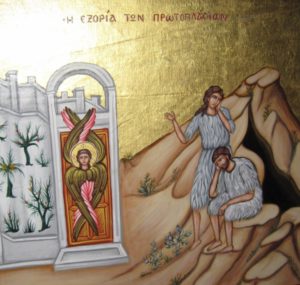21 February OS 2017: Monday of the Second Week of Lent; S. Timothy of Symbola
The first reading at Vespers today is Genesis 3:21 – 4:7.
“And He cast out Adam, and caused him to dwell over against the garden of delight, and he stationed the Cherubim, and the fiery sword which turneth about to keep the way of the tree of life.” The Lord placed Adam “over against” (i.e., nearby and directly across from) the gate to Paradise, so that the sight of Paradise, the rustling of its leaves, and its ineffable life-giving fragrance, ever near to him yet ever closed to him by the fiery Cherubimic sword, would provoke him to weep fiery tears constantly in profound grief over the perfect happiness he threw away for one moment of “freedom” from God. Adam and Eve lived the rest of their long lives in constant repentance, and we rank them with the saints of the Church.
Man, even in his most depraved representatives, still seeks Paradise. He desires an ultimate happiness that he cannot lose, and he spends his life seeking it. He seeks it on this fallen earth and cannot find it edmedicom.com. He seeks to build Paradise on earth and creates hell for himself. He ignores God’s command and tries to circumvent the fiery sword of God’s judgment, to take Paradise by stealth. He always fails.
Blessed are they who bow to God’s judgment and weep over their sins. Blessed are they who take compassion on their fellow penitents and weep with them, feeling the sorrows of the other as their own. Blessed are they who gratefully acquiesce to the limited earthly happiness God has decreed for them in this life, whether great or small. Blessed are they who do not seek Paradise on earth but in the age to come.
May we, this Great Lent, stand before the fiery sword at the gate of Paradise, scenting its fragrance and hearing the rustle of its leaves from afar, that is, may we stand in the Church of God, judging ourselves before the Judgment and receiving within our hearts the assurance of the forgiveness of our sins, the bright sorrow which gives hope, and the pledge of eternal life.

